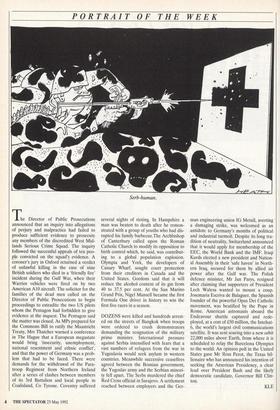PORTRAIT OF THE WEEK
Serb-human.
The Director of Public Prosecutions announced that an inquiry into allegations of perjury and malpractice had failed to produce sufficient evidence to prosecute any members of the discredited West Mid- lands Serious Crime Squad. The inquiry followed the successful appeals of ten peo- ple convicted on the squad's evidence. A coroner's jury in Oxford returned a verdict of unlawful killing in the case of nine British soldiers who died in a 'friendly fire' incident during the Gulf War, when their Warrior vehicles were fired on by two American A10 aircraft. The solicitor for the families of the dead men called on the Director of Public Prosecutions to begin proceedings to extradite the two US pilots whom the Pentagon had forbidden to give evidence at the inquest. The Pentagon said the matter was closed. As MPs prepared for the Commons Bill to ratify the Maastricht Treaty, Mrs Thatcher warned a conference in The Hague that a European megastate would bring 'insecurity, unemployment, national resentment and ethnic conflict', and that the power of Germany was a prob- lem that had to be faced. There were demands for the withdrawal of the Para- troop Regiment from Northern Ireland after a series of clashes between members of its 3rd Battalion and local people in Coalisland, Co Tyrone. Coventry suffered
several nights of rioting. In Hampshire a man was beaten to death after he remon- strated with a group of youths who had dis- rupted his family barbecue.The Archbishop of Canterbury called upon the Roman Catholic Church to modify its opposition to birth control which, he said, was contribut- ing to a global population explosion. Olympia and York, the developers of Canary Wharf, sought court protection from their creditors in Canada and the United States. Gordons said that it will reduce the alcohol content of its gin from 40 to 37.5 per cent. At the San Marino Grand Prix, Nigel Mansell became the first Formula One driver in history to win the first five races in a season.
DOZENS were killed and hundreds arrest- ed on the streets of Bangkok when troops were ordered to crush demonstrators demanding the resignation of the military prime minister. International pressure against Serbia intensified with fears that a vast numbers of refugees from the war in Yugoslavia would seek asylum in western countries. Meanwhile successive ceasefires agreed between the Bosnian government, the Yugoslav army and the Serbian minori- ty fell apart. The Serbs murdered the chief Red Cross official in Sarajevo. A settlement reached between employers and the Ger- man engineering union IG Metall, averting a damaging strike, was welcomed as an antidote to Germany's months of political and industrial turmoil. Despite its long tra- dition of neutrality, Switzerland announced that it would apply for membership of the EEC, the World Bank and the IMF. Iraqi Kurds elected a new president and Nation• al Assembly in their 'safe haven' in North- ern Iraq, secured for them by allied air power after the Gulf war. The Polish defence minister, Mr Jan Parys, resigned after claiming that supporters of President Lech Walesa wanted to mount a coup. Josemaria Escriva de Balaguer, the Spanish founder of the powerful Opus Dei Catholic movement, was beatified by the Pope in Rome. American astronauts aboard the Endeavour shuttle captured and rede- ployed, at a cost of £50 million, the Intelsat- 6, the world's largest civil communications satellite. It was sent soaring into a new orbit 22,000 miles above Earth, from where it is scheduled to relay the Barcelona Olympics to the world. An opinion poll in the United States gave Mr Ross Perot, the Texas bil- lionaire who has announced his intention of seeking the American Presidency, a clear lead over President Bush and the likely democratic candidate, Governor Bill Clin- ton.
KLE


































































 Previous page
Previous page